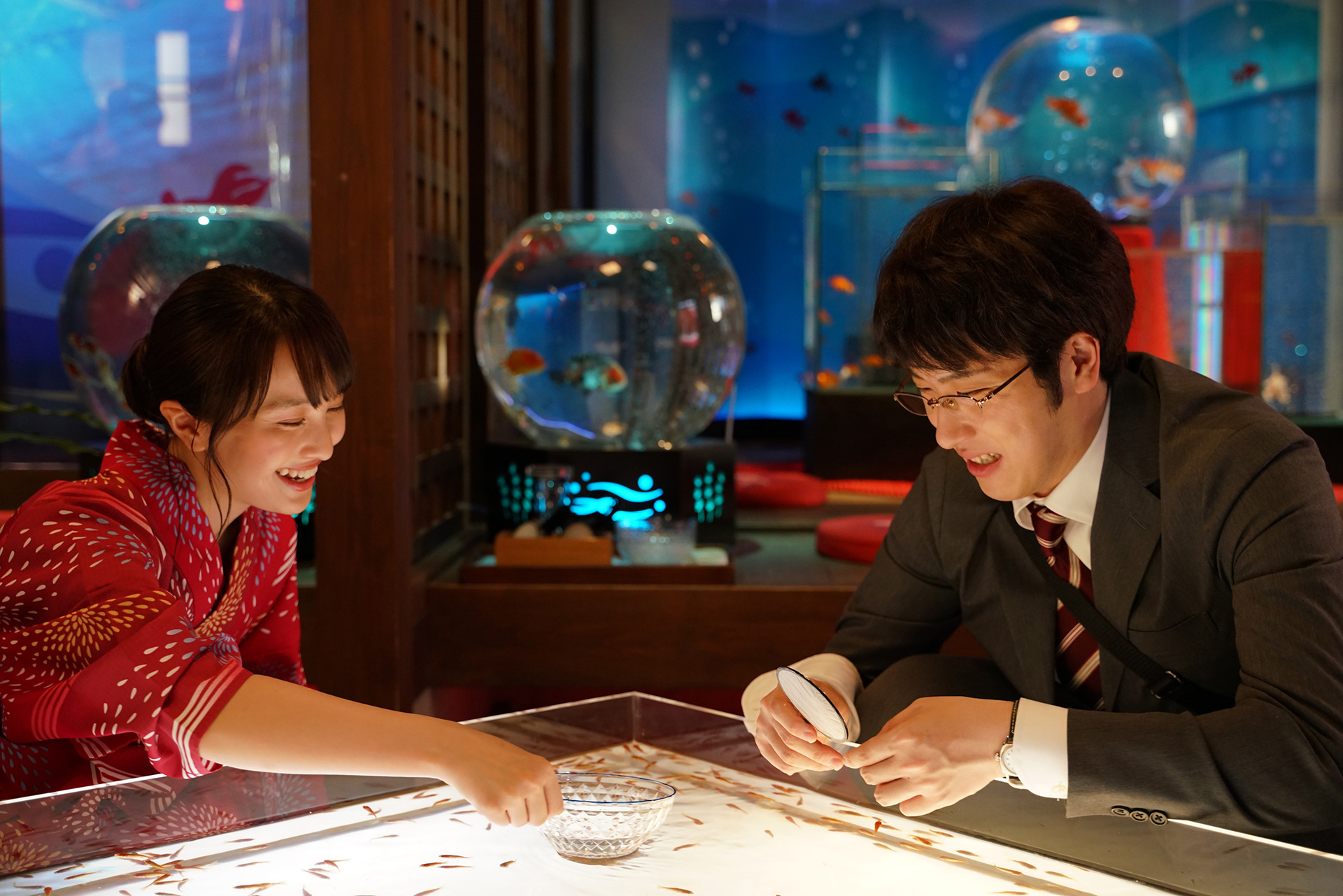There are two types of people in this world: those who find a 90-minute romantic comedy musical with a 90-second song serving as an intermission break twee; and those who find it charming. Middle ground doesn’t exist in this equation and director Yukinori Makabe rightfully refuses to pretend otherwise. His film Love, Life and Goldfish (adapted by Atsumi Tsuchi from Noriko Otani’s manga of the same name) wears its idiosyncratic feel-good sentimentality on its sleeve to provide the dreamlike environment Makoto Kashiba (Matsuya Onoe) needs to break free from a repressed life precariously balanced atop a foundation of work. His bank clerk has never tapped into the emotional well filling within for almost thirty years, so it’s no surprise he’s springing volatile leaks everywhere he turns.
It’s why he finds himself in this foreign place he disparagingly dismisses as “the sticks” when he had a flourishing career in Tokyo just days prior. One mistake with the boss got him demoted and transferred and he’s not sure there’s any hope of a return. He’ll do his best, though, by dedicating himself to “the numbers” with an emotionless demeanor that has new, personable-to-a-fault coworkers slack-jawed with uncertainty. They love their small town and genuinely enjoy each other’s company outside the office, so seeing Makoto robotically walk around is somewhat unnerving. Asuka (Nicole Ishida) is the only one who embraces it because she considers his stoicism attractive due to its ability to earn him success. Unfortunately for her, his eyes are laser-focused on someone else.
Her name is Yoshino Ikoma (Kanako Momota, lead singer of Momoiro Clover Z), owner of a goldfish-scooping store. It’s love at first sight for Makoto. He follows her into her establishment with no idea about its purpose and unsurprisingly (since Japanese humor often skews awkwardly sexual) believes it’s the lobby front of a brothel. The truth, however, is that it’s a game able to transport any local back to his or her childhood no matter their age. There are large, shallow tanks with hundreds of tiny red goldfish swimming about; you’re given three minutes to scoop as many as you can into a bowl with a flat paper ladle. Makoto’s idea of fun is refinancing your mortgage, so the simple joy Yoshino supplies is lost on him completely.
And that’s the point. Big City Ego forced to engage with Small Town Enchantment is truly mixing oil and water. The first resident Makoto meets is named Noboru (Hayato Kakizawa) and his goldfish salesman is this banker’s textbook antithesis: kind, empathetic, charitable, and above all else carefree. Though Makoto is embarrassed to even think about riding to his new home in Noboru’s wild truck, he has no choice. To him Noboru is a sucker saddled with a “loser’s smile,” thus unworthy of the chance to pursue the type of wealth he sees himself having squandered. That’s the thinking Otani and company hope to reverse by embedding Makoto into this town to discover whether he can alter the course of his downward trajectory.
It means embracing his emotions, providing an outlet for his pent-up rage, and allowing himself to be vulnerable enough to open his heart to someone (if not everyone). It’s harder than it sounds, in large part because Makoto is so far gone that he can’t tell when his uncensored thoughts are being shared out-loud or in his head anymore. I don’t just mean the songs either—they’re all diegetic in some form. I mean something as simple as accidentally blurting out how games like goldfish-scooping are a waste of time while his new coworkers are playing it during his welcome party. Sometimes it’s sharing more about himself than he should with Asuka to fan the flames of her crush while closing himself off from Yoshino.
Onoe plays the role very big, to nice effect—he’s supposed to be the one able to keep everything business-like and transactional. It’s broad, expressive comedy from start to finish, demanding the benefit of the doubt. I don’t think that’s too difficult, though, since Love, Life and Goldfish is saccharine enough to rot your teeth. If you haven’t left the theater by the time Makoto reaches his “corporate housing” that first night, you’ve accepted the tone and realize it will only get sweeter. Because while this stranger in a strange land tries his damnedest to bestow urban expertise onto the yokels (in ways that will have you wondering why anyone could like his pushy, self-centered know-it-all), they’re rubbing off on him.
How that occurs could have been disastrous if Makabe weren’t careful. He could have played up the love triangle and made the endgame about pairing people off for happily-ever-afters without considering how evolution and indoctrination aren’t the same thing. Makoto belongs in Tokyo; the rest of his characters belong in the country. Just because they’re from different places and enjoy different things, however, doesn’t mean they can’t also be friends. What Makoto feels about Yoshino and what Asuka feels about him is therefore less about love than the exhilarating excitement of the unknown. They’ve all felt like rejects for so long that learning the other shoe fares the same is the necessary jolt towards realizing life is what you make it. Never stifle your passions.
Love, Life and Goldfish is playing the Fantasia International Film Festival.

